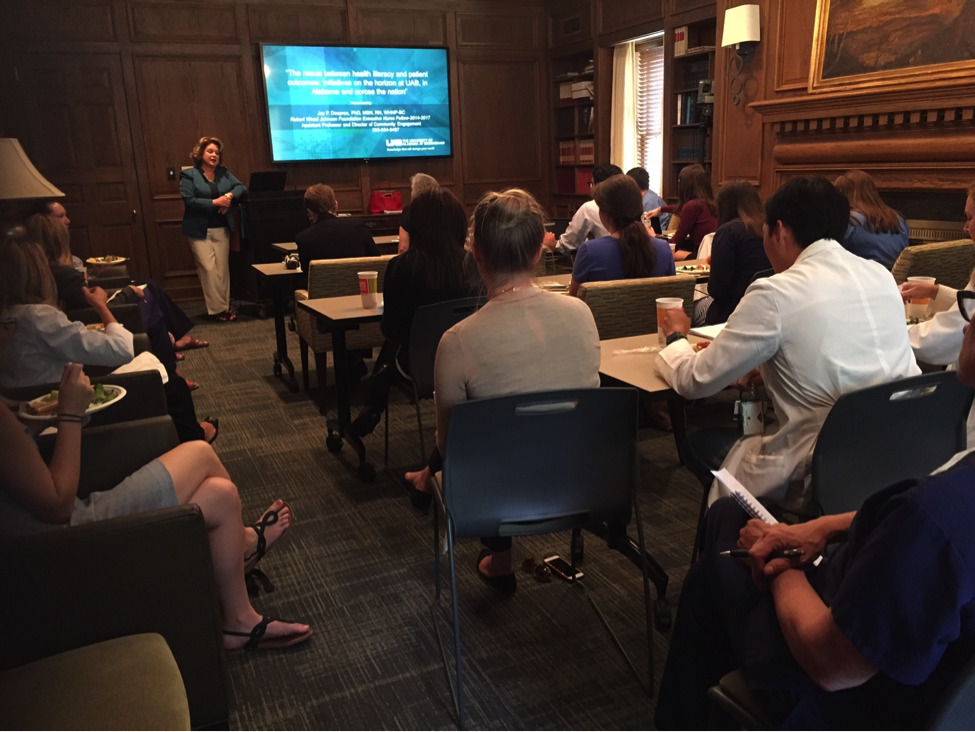 UAB School of Nursing Assistant Professor and Alabama Health Literacy Council founder and colead Joy Deupree, PhD, MSN, RN, WHNP-BC, provided an overview of local, state, and national efforts to improve health outcomes by addressing low health literacy.In her days as a practicing nurse, Dr. Joy Deupree often wondered about the patients who seemed “noncompliant”—refusing to show for important medical appointments, taking more or less medicine than prescribed, ignoring discharge instructions, or leaving paperwork unfinished. She made a life-changing connection when she accompanied her daughter to a training on becoming a tutor and realized that these are the classic symptoms of an under-recognized barrier to health care: the inability to read or write.
UAB School of Nursing Assistant Professor and Alabama Health Literacy Council founder and colead Joy Deupree, PhD, MSN, RN, WHNP-BC, provided an overview of local, state, and national efforts to improve health outcomes by addressing low health literacy.In her days as a practicing nurse, Dr. Joy Deupree often wondered about the patients who seemed “noncompliant”—refusing to show for important medical appointments, taking more or less medicine than prescribed, ignoring discharge instructions, or leaving paperwork unfinished. She made a life-changing connection when she accompanied her daughter to a training on becoming a tutor and realized that these are the classic symptoms of an under-recognized barrier to health care: the inability to read or write.
Since the early 2000s, Deupree has immersed herself in the challenge to improve the rate of health literacy in Alabama. Nationally 30% of the population reads at or below a 5th grade level; when factoring in numeracy, the rate exponentially increases. In Alabama, it is estimated that up to 57% of the adult population suffers from low health literacy. “It’s not surprising so many patients have poor outcomes, often as a result of misunderstood protocols and mistakes with medications that lead to excess hospitalizations and unnecessary complications, including death,” she said.
Deupree stressed that while low health literacy is associated with being poor, from a cultural/ethnic minority, a recent refugee or a non-English speaker, and/or someone who did not complete high school, “you can’t judge a book by its cover—the largest group of individuals with low health literacy rates is seniors 65 and older, who are a long way from what they learned in school, have a great deal of trust in providers, and don’t like to admit a lack of knowledge.”
Even more surprising, the U.S. Department of Health and Human Services estimates that 9 out of 10 Americans, regardless of their education level, struggle with health information but may be too embarrassed to admit it. “Informed consent forms, discharge instructions, and prescription drug labels are rarely written in plain language, and can be confusing even to those of us who are in clinical care or research” she said.
The estimated economic burden on an already overwhelmed health system is staggering, between $106 and 238 billion in unnecessary health costs per year. Over the past decade, a growing awareness of health literacy as an economic drag and barrier to health care has resulted in numerous local, statewide, and national initiatives addressing its negative impacts.
Below is a brief summary of research topics, programs, and policy efforts that Deupree highlighted (for more in-depth information, see her slides):
- Adding health information to the curriculum for K-12 education
- Rewriting informed consent forms in plain language
- Improving provider education on how to identify and work with low literacy patients
- Offering CME credit to providers who train with free online materials (such as the CDC modules)
- Making prescription drug labels more patient friendly (such efforts often require buy-in from policy makers and big box chains with pharmacies)
- Re-engineering Discharge Toolkit (the Red Project) (requires buy-in from hospitals)
- Joining professional organizations dedicated to reducing health literacy via education, research, and sharing best practices
- Establishing coalitions of researchers, clinicians, community advocates, insurance companies, and policy makers such as the Alabama Health Literacy Initiative (Deupree helped establish along with Dr. Nancy Dunlap)
- Adding literacy as a field with an alert in the electronic medical record
- Supporting campaigns such as Know Your Meds AL, sponsored by Centers for Medical Services (CMS) and championed by the Alabama Quality Assurance Foundation
- Creating easy to understand and culturally competent patient materials
- Training frontline health care staff about health literacy issues
The CCTS recognizes the importance of health literacy as it relates to the success of three major goals of the national CTSA program: (1) to engage patients and communities in every phase of the translational process (2) to promote the integration of special and underserved populations in translational research across the human lifespan and (3) to innovate processes to increase the quality and efficiency of translational research, including multisite trials.
CCTS Director of Special Populations and UAB Minority Health & Health Disparities Research Center Director Dr. Mona Fouad has developed a successful program that addresses low health literacy by training community members of underserved populations to work as patient navigators (PNs) for clinical trial recruitment. The Increasing Minority Participation in Clinical Trials (IMPaCT) Program was implemented at UAB in 2006 to help identify and overcome barriers to participation. PNs communicate with patients in non-clinical, plain language, explaining the purpose of potential trials, reviewing consent forms and treatment plans, and answering questions about any issues that could pose a problem for retaining patients in a trial. To learn more, see "Patient Navigation Workshop 'Trains the Trainer'."
The WIP seminar series is jointly coordinated by the UAB Center for Outcomes Effectiveness Research and Education (COERE), the Deep South Musculoskeletal Center for Education and Research on Therapeutics (CERTs), the Lister Hill Center for Health Policy, and the CCTS. Visit our events page and subscribe to CCTS Digest to hear about future learning opportunities.